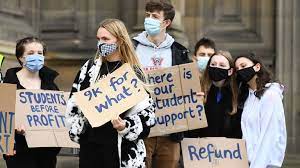SHOUTING INTO THE ABYSS - EMILY LEWIS - UK
- makfor9
- 20 ago 2021
- Tempo di lettura: 5 min
How the British government has ignored university students during the COVID-19 pandemic
In the UK, normal life as we know it has been transformed due to COVID-19. The new normal of social distancing and vastly reduced human contact, after multiple lockdowns through 2020 and 2021, has seen many typically in-person activities moving online. University students have found themselves sat behind laptop screens for hours every day for lectures, seminars and lab sessions. This online university has not been coupled with a drop in tuition fees, with students not receiving any refund or acknowledgment of this significant change to university life from the British government. Students are not naive; most expected university to be largely unrecognisable due to the threat of the pandemic and need to protect society. However, it is the manner in which this pandemic has been handled by the British government and in particular, how university students have been treated, that has angered students nationwide. As the crisis continues, doubts are raising over the future of higher education.
The Marketisation of University
Ever since the move to make universities fee paying, the role of the student in higher education has rapidly changed. From one furthering their academic credentials at the cost of the government, students are now fee-paying consumers of a product in a billion-pound business system. In 1998, the Labour government led by Tony Blair made this landmark change to higher education, despite promising that ‘Labour has no plans to introduce tuition fees for higher education.’ The Teaching and Higher Education Act of 1998 introduced tuition fees for the expanding university sector, set at £1,000 for those with parents who earnt over £34,000 a year, with no fees for those with parents on less than £16,000 a year. The reasoning behind this monumental shift from a system where the government paid university fees and maintenance grants lay in the fact that higher education could not cope with the expanding number of students seeking degrees. As student numbers began to increase, the Labour government argued that it was not feasible to fund all students with public money.
Despite many campaign pledges by differing political parties to oppose tuition fees, or not to increase them, in 2006, fees rose to £3,000. But worse was yet to come. Fees were increased again to £3,290 under Labour’s Gordon Brown, and after the financial crisis of the late 2010s, the results of the Browne review saw fees rocketing to £9,000 a year. This came after promises from the coalition Conservative and Liberal Democrat government to scrap fees for higher education altogether, only for politicians to realise the new business style of university would not cope without this new system. The latest change came in 2016, with fees increased another £250 to £9,250 a year. And so, since the 1990s, higher education students have been consumers of a product that becomes progressively more expensive.
The Effect of COVID-19
When the pandemic swept across the world in the spring of 2020, many students abruptly saw their academic year move online, and university life grind to a halt. Whilst the early motions taken by universities were expected due to the novel disease and lack of widespread understanding of how this would be tackled, as the pandemic continued into the start of the new academic year in September 2020, a crisis unfolded and students have ever since been largely forgotten.
In the summer of 2020, students were promised blended learning, mixed online and on-campus teaching, and an education that was not diminished in quality. Thousands began their university experience, or returned to continue their degrees, hoping for this government backed high-quality education. However, as COVID-19 began to spread in a second wave through the country, rates amongst students rose as they moved across the country to new cities and mixed with new people. University students saw themselves shut in expensive accommodation halls, or private rented housing, receiving a wholly online education whilst being scapegoated as the spreaders of COVID-19. With recycled recorded lectures being delivered at some universities, to shut facilities such as libraries and laboratories, to no consideration of young adults need to do something other than sit behind a computer and study, the student experience was not what many were told to expect. Yet the government persistently did not address university students in their daily briefings.
As such, students have been gaslighted. Led down a deluded path, universities have frequently insisted that teaching quality has not been impacted and made worse and the full tuition fees subsequently have remained in place. Many petitions by students for refunds to the House of Commons have been pushed aside. Students have been told it is up to individual universities to decide on refunds or for them to rally their university directly. With students already lacking in voice and power to create significant change, this governmental response appeared an easy route as they could absolve themselves from any responsibility.
The lack of attention to university students was noticeable in Prime Minister Boris Johnson’s lockdown address to the nation on January 4th, 2021. As the Prime Minister announced yet another lockdown to weary citizens, universities were not mentioned once, with a vague instruction that students should not travel but stay at home. A statement ignorant of the reality that students have to commit months in advance to expensive private housing contracts they were paying rent for, or contracts for halls to their university. This has been happening whilst the government has poured incredible attention on school students, seemingly forgetting that once eighteen, students do not disappear. Rather they, as I have shown earlier, largely pursue further, expensive education that previous British governments have created.
Therefore, the inadequate ‘we’ll pocket your fees and figure out the rest later’ response from the government – as The Guardian writer Sonia Sodha adequately summed up – has left students angered and exasperated. University students are manipulated consumers of a poor service that for any other consumer product in society, would have seen some refund or protection. Whilst some have found online studying more convenient as it saves costly commuting fees or fits more appropriately around individual’s schedules, the vast majority of students have suffered from the lack of interaction for the high price. Again, Sodha rightly voices: ‘the government is happy to treat students as consumers when it supports their marketisation drive, less so when it might involve refunds.’ And now, as the education secretary announced cuts to funding for some arts degrees, and the prospect of raising fees being considered by the chancellor, we must take a long hard look at our higher education system before it is too late. With some universities also declaring autumn 2021 will be “hybrid”, with all lectures online and only a small number of taught sessions in person, the system needs to be challenged. How can all normal life have resumed, including nightclubs, but students won’t be allowed to sit in a lecture? Perhaps the government can take a moment to address clearly and fairly their future workers and political support banks before it is too late.






Commenti